Theories, Principles, Models: Inspirational Teaching & Learning
VerifiedAdded on 2023/06/17
|11
|708
|172
Report
AI Summary
This report explores various communication and learning theories relevant to inspirational teaching, including transactional analysis, the communicational cycle, the Johari window, and the Shannon-Weaver model. It emphasizes effective listening skills and addresses barriers to communication. The report concludes that understanding these theories is essential for improving communication skills and fostering a better understanding between teachers and learners. Desklib offers a wealth of resources, including solved assignments and past papers, to further support students in their educational endeavors.
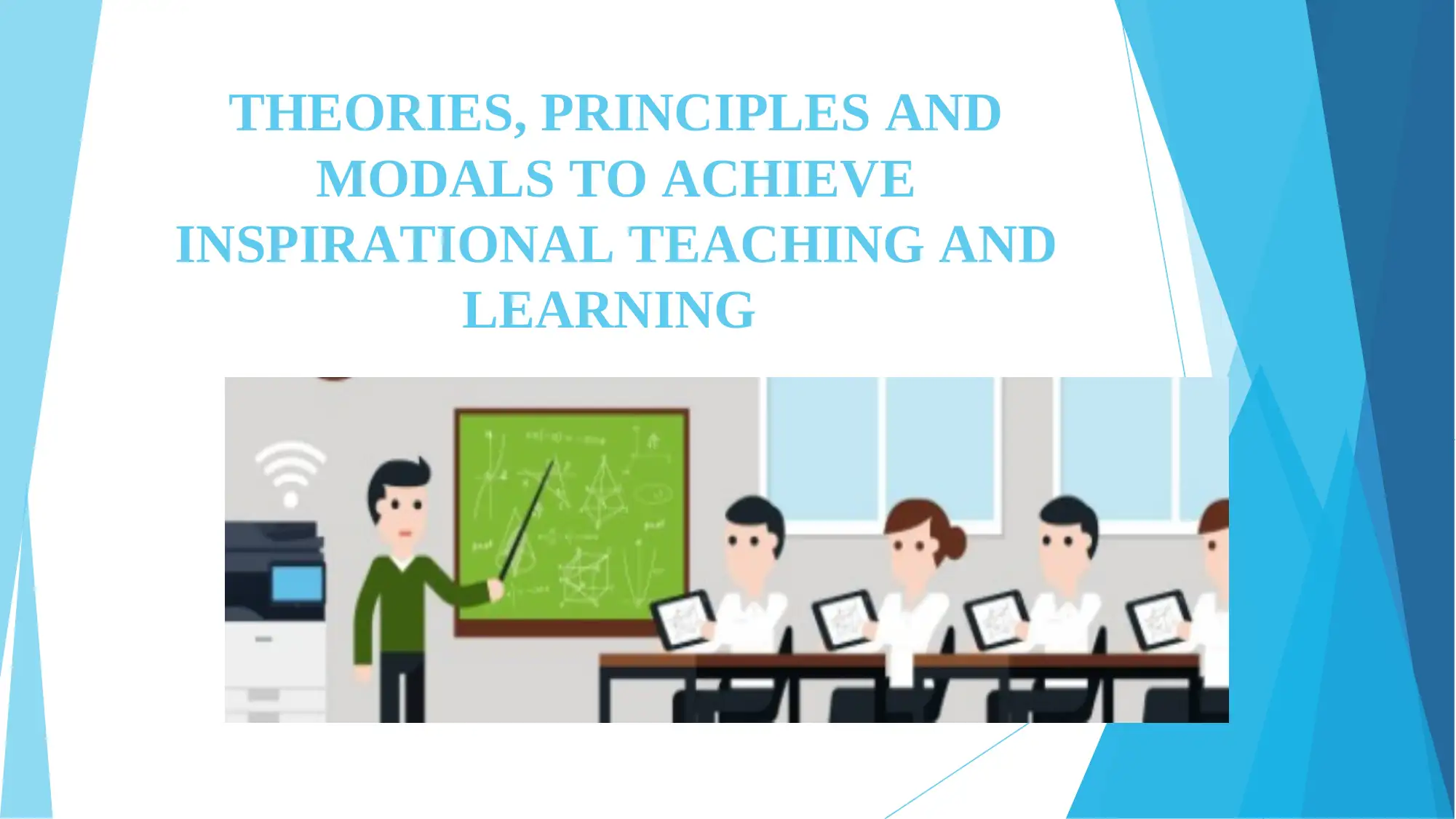
THEORIES, PRINCIPLES AND
MODALS TO ACHIEVE
INSPIRATIONAL TEACHING AND
LEARNING
MODALS TO ACHIEVE
INSPIRATIONAL TEACHING AND
LEARNING
Paraphrase This Document
Need a fresh take? Get an instant paraphrase of this document with our AI Paraphraser
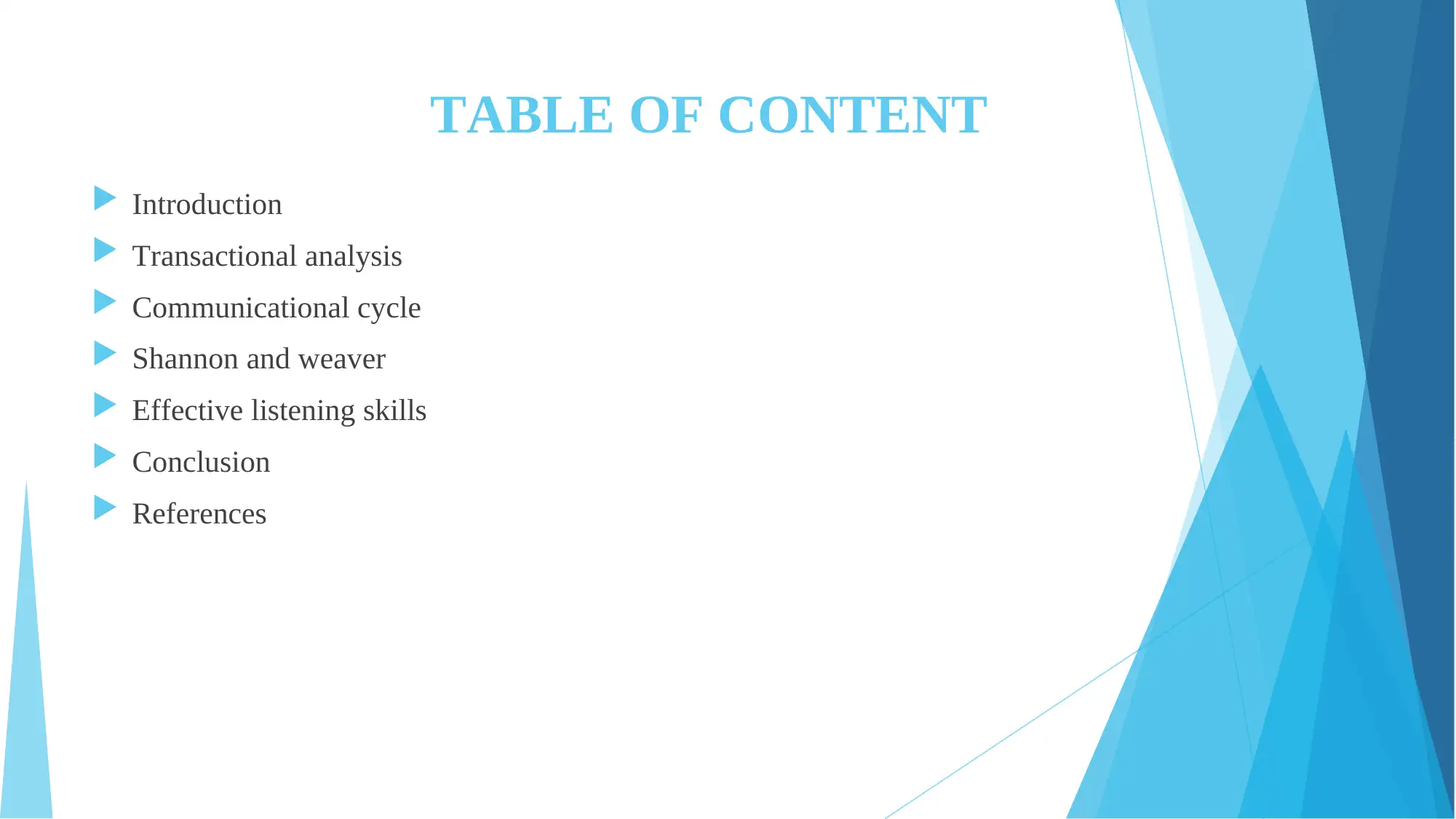
TABLE OF CONTENT
Introduction
Transactional analysis
Communicational cycle
Shannon and weaver
Effective listening skills
Conclusion
References
Introduction
Transactional analysis
Communicational cycle
Shannon and weaver
Effective listening skills
Conclusion
References
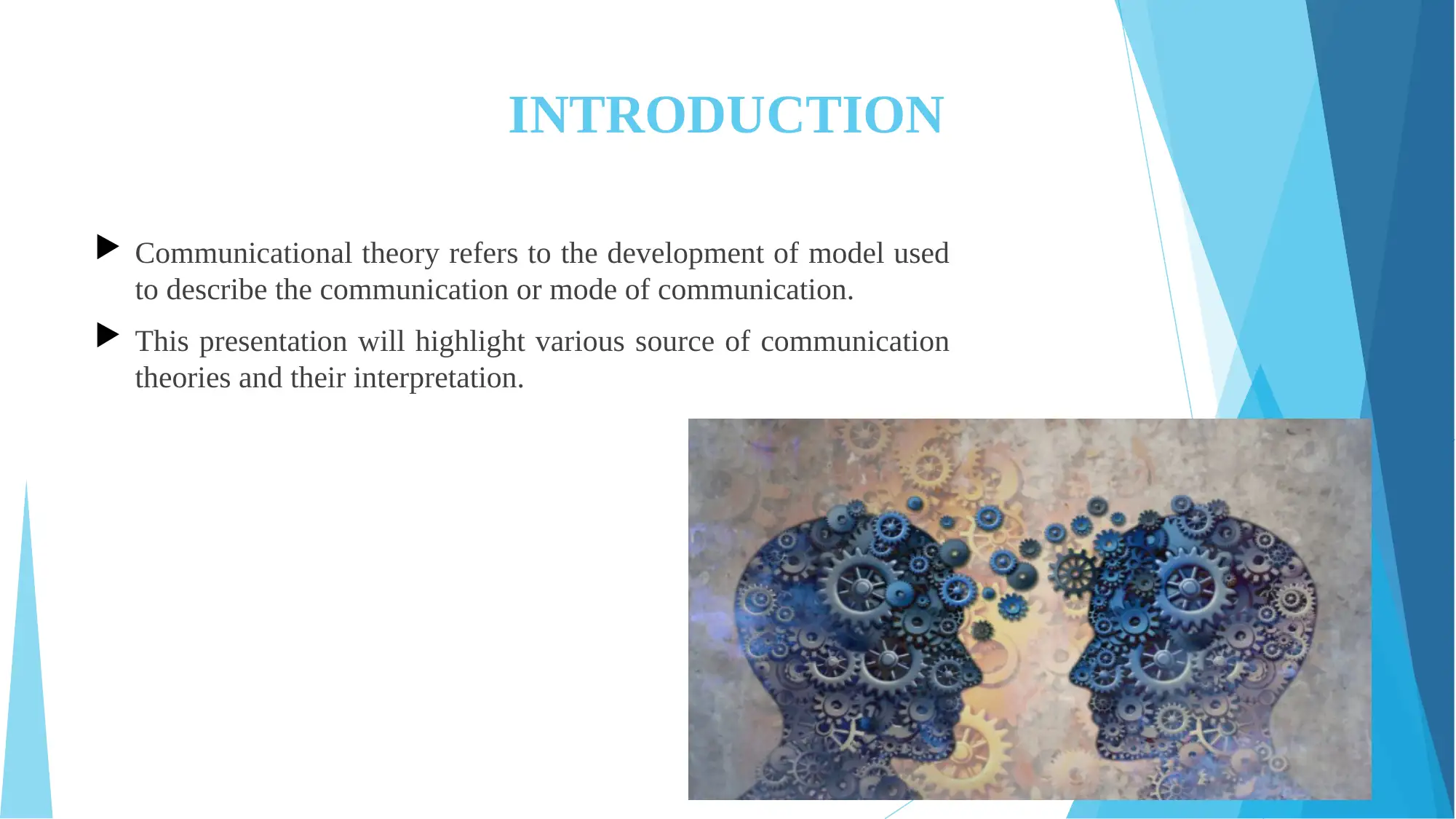
INTRODUCTION
Communicational theory refers to the development of model used
to describe the communication or mode of communication.
This presentation will highlight various source of communication
theories and their interpretation.
Communicational theory refers to the development of model used
to describe the communication or mode of communication.
This presentation will highlight various source of communication
theories and their interpretation.
⊘ This is a preview!⊘
Do you want full access?
Subscribe today to unlock all pages.

Trusted by 1+ million students worldwide
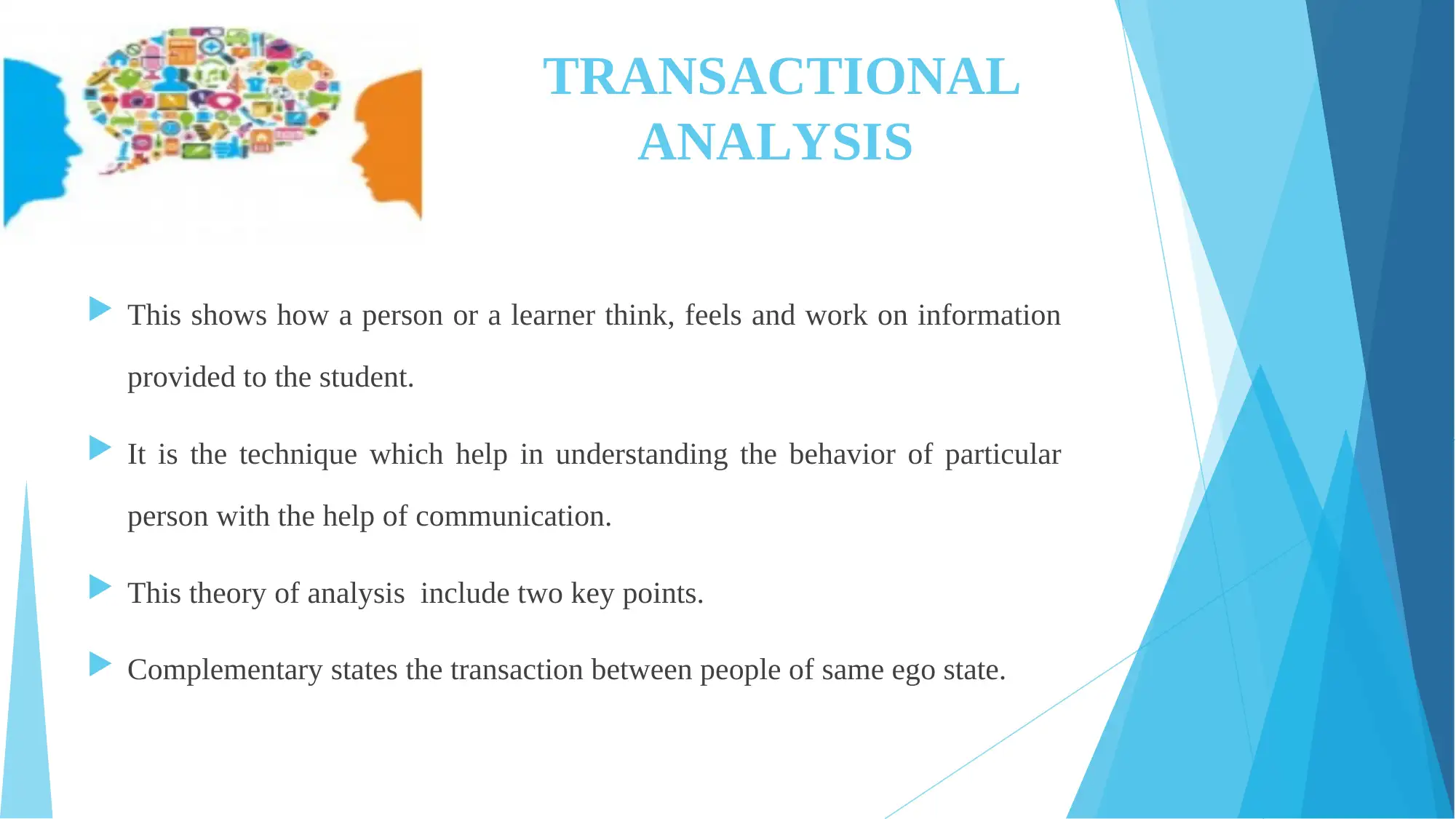
TRANSACTIONAL
ANALYSIS
This shows how a person or a learner think, feels and work on information
provided to the student.
It is the technique which help in understanding the behavior of particular
person with the help of communication.
This theory of analysis include two key points.
Complementary states the transaction between people of same ego state.
ANALYSIS
This shows how a person or a learner think, feels and work on information
provided to the student.
It is the technique which help in understanding the behavior of particular
person with the help of communication.
This theory of analysis include two key points.
Complementary states the transaction between people of same ego state.
Paraphrase This Document
Need a fresh take? Get an instant paraphrase of this document with our AI Paraphraser
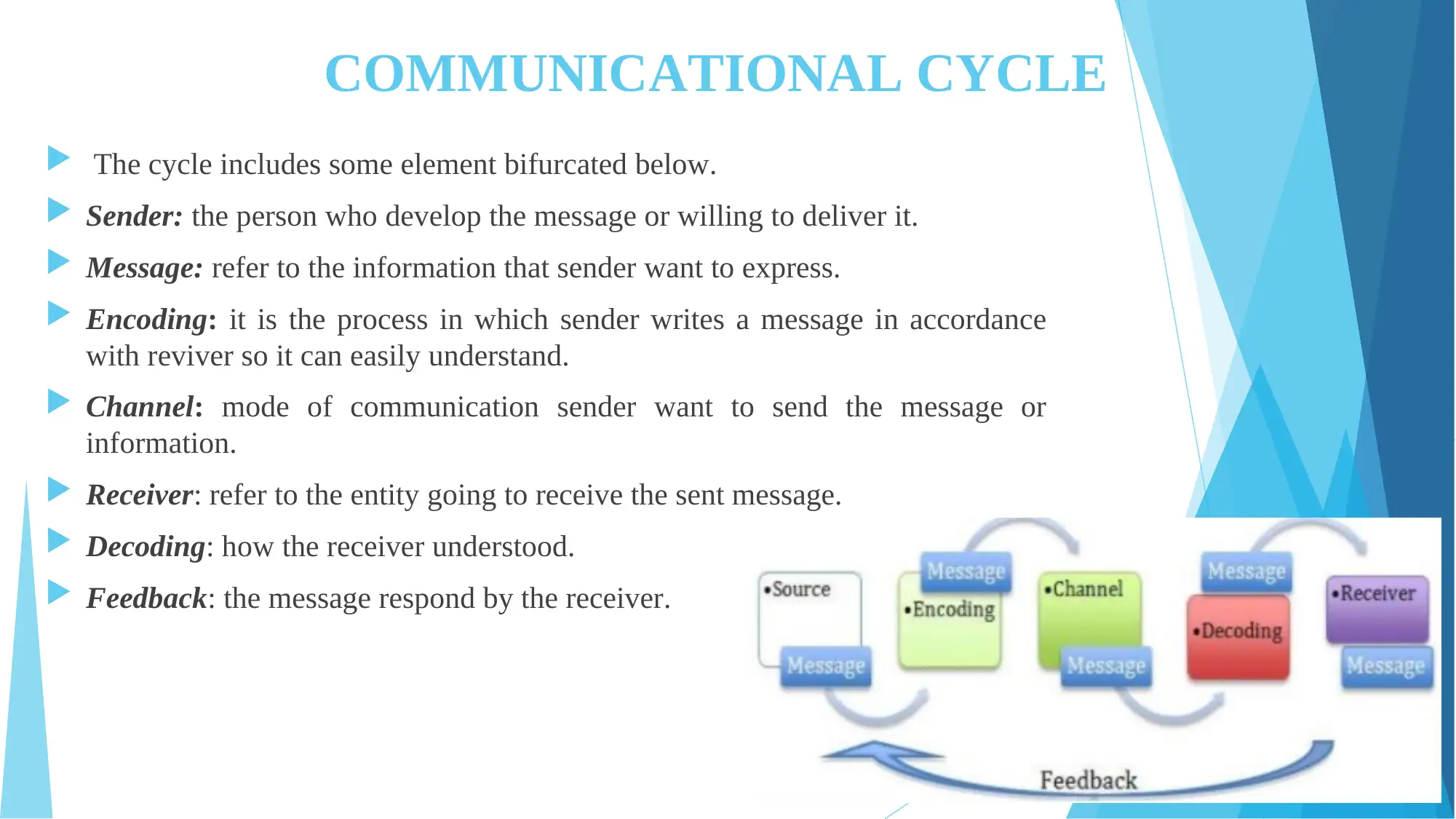
COMMUNICATIONAL CYCLE
The cycle includes some element bifurcated below.
Sender: the person who develop the message or willing to deliver it.
Message: refer to the information that sender want to express.
Encoding: it is the process in which sender writes a message in accordance
with reviver so it can easily understand.
Channel: mode of communication sender want to send the message or
information.
Receiver: refer to the entity going to receive the sent message.
Decoding: how the receiver understood.
Feedback: the message respond by the receiver.
The cycle includes some element bifurcated below.
Sender: the person who develop the message or willing to deliver it.
Message: refer to the information that sender want to express.
Encoding: it is the process in which sender writes a message in accordance
with reviver so it can easily understand.
Channel: mode of communication sender want to send the message or
information.
Receiver: refer to the entity going to receive the sent message.
Decoding: how the receiver understood.
Feedback: the message respond by the receiver.
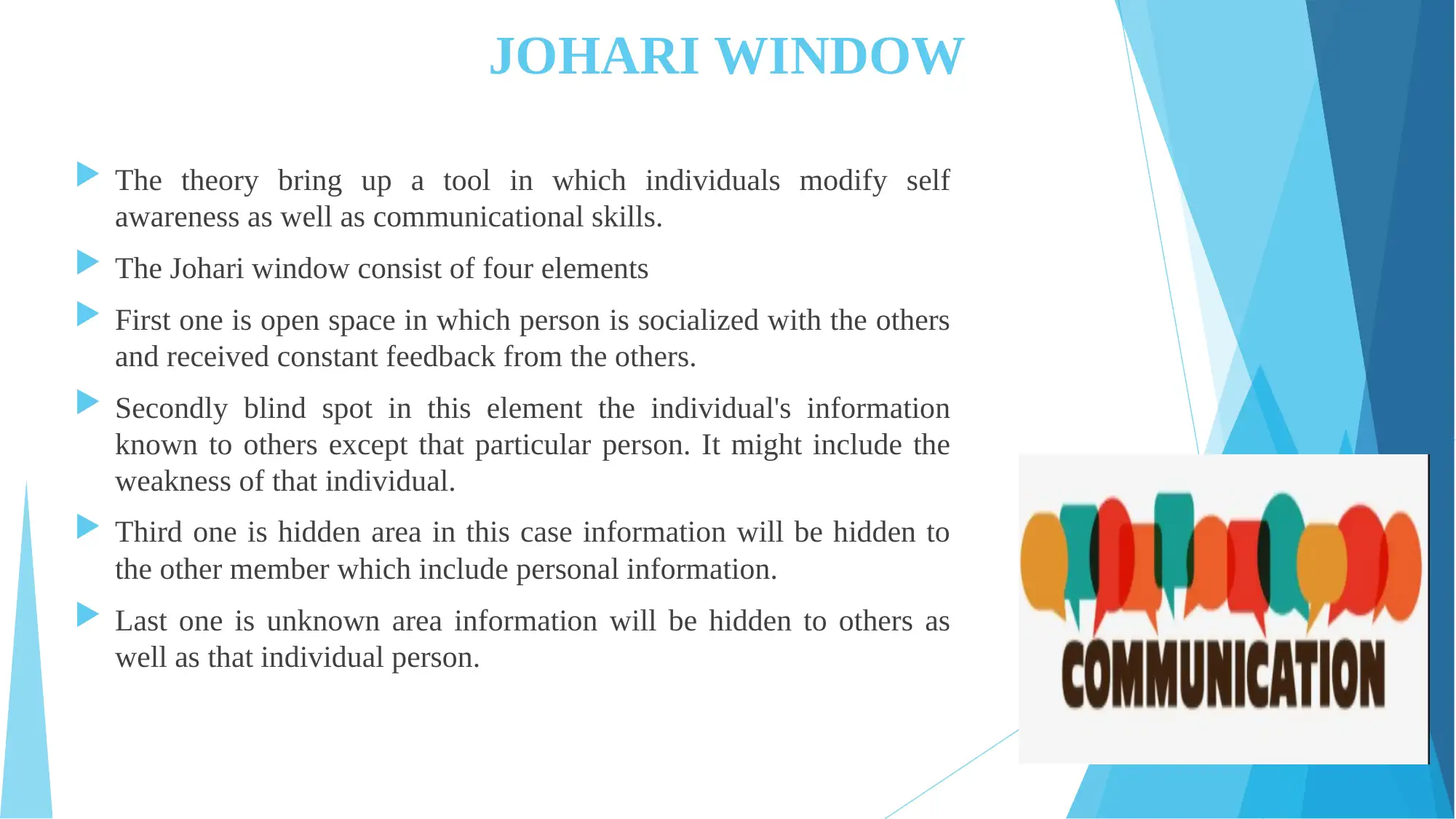
JOHARI WINDOW
The theory bring up a tool in which individuals modify self
awareness as well as communicational skills.
The Johari window consist of four elements
First one is open space in which person is socialized with the others
and received constant feedback from the others.
Secondly blind spot in this element the individual's information
known to others except that particular person. It might include the
weakness of that individual.
Third one is hidden area in this case information will be hidden to
the other member which include personal information.
Last one is unknown area information will be hidden to others as
well as that individual person.
The theory bring up a tool in which individuals modify self
awareness as well as communicational skills.
The Johari window consist of four elements
First one is open space in which person is socialized with the others
and received constant feedback from the others.
Secondly blind spot in this element the individual's information
known to others except that particular person. It might include the
weakness of that individual.
Third one is hidden area in this case information will be hidden to
the other member which include personal information.
Last one is unknown area information will be hidden to others as
well as that individual person.
⊘ This is a preview!⊘
Do you want full access?
Subscribe today to unlock all pages.

Trusted by 1+ million students worldwide
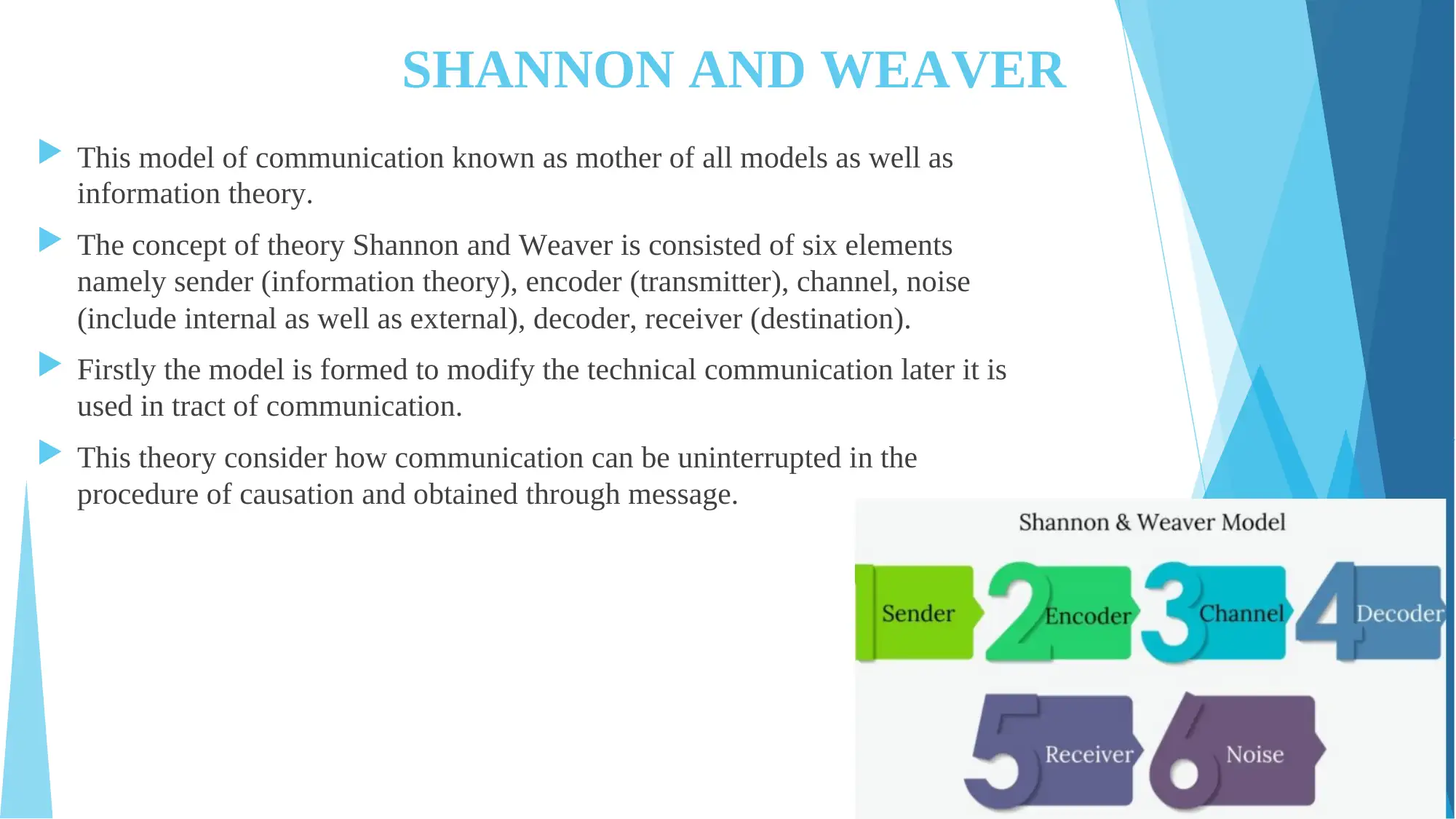
SHANNON AND WEAVER
This model of communication known as mother of all models as well as
information theory.
The concept of theory Shannon and Weaver is consisted of six elements
namely sender (information theory), encoder (transmitter), channel, noise
(include internal as well as external), decoder, receiver (destination).
Firstly the model is formed to modify the technical communication later it is
used in tract of communication.
This theory consider how communication can be uninterrupted in the
procedure of causation and obtained through message.
This model of communication known as mother of all models as well as
information theory.
The concept of theory Shannon and Weaver is consisted of six elements
namely sender (information theory), encoder (transmitter), channel, noise
(include internal as well as external), decoder, receiver (destination).
Firstly the model is formed to modify the technical communication later it is
used in tract of communication.
This theory consider how communication can be uninterrupted in the
procedure of causation and obtained through message.
Paraphrase This Document
Need a fresh take? Get an instant paraphrase of this document with our AI Paraphraser
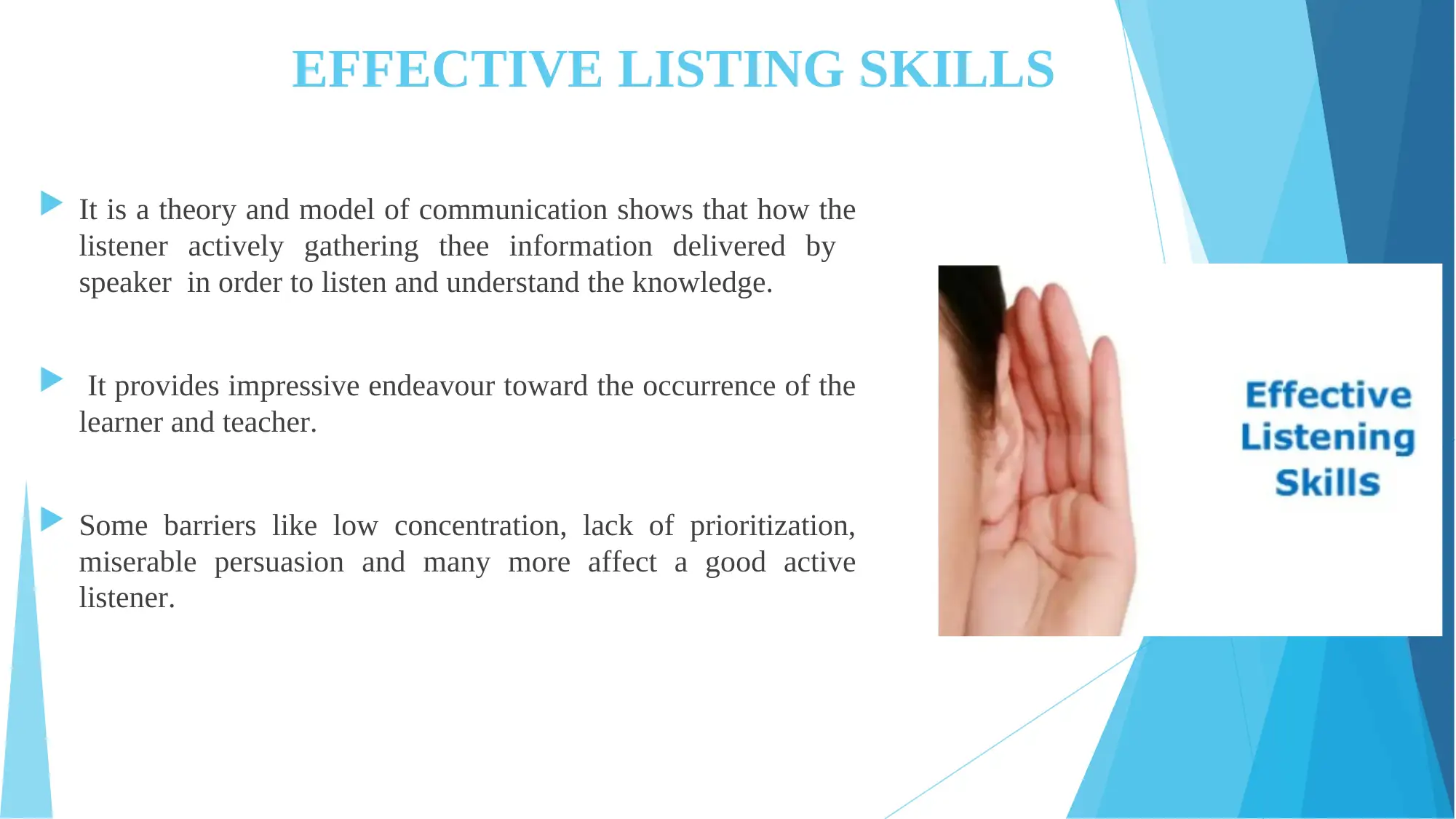
EFFECTIVE LISTING SKILLS
It is a theory and model of communication shows that how the
listener actively gathering thee information delivered by
speaker in order to listen and understand the knowledge.
It provides impressive endeavour toward the occurrence of the
learner and teacher.
Some barriers like low concentration, lack of prioritization,
miserable persuasion and many more affect a good active
listener.
It is a theory and model of communication shows that how the
listener actively gathering thee information delivered by
speaker in order to listen and understand the knowledge.
It provides impressive endeavour toward the occurrence of the
learner and teacher.
Some barriers like low concentration, lack of prioritization,
miserable persuasion and many more affect a good active
listener.
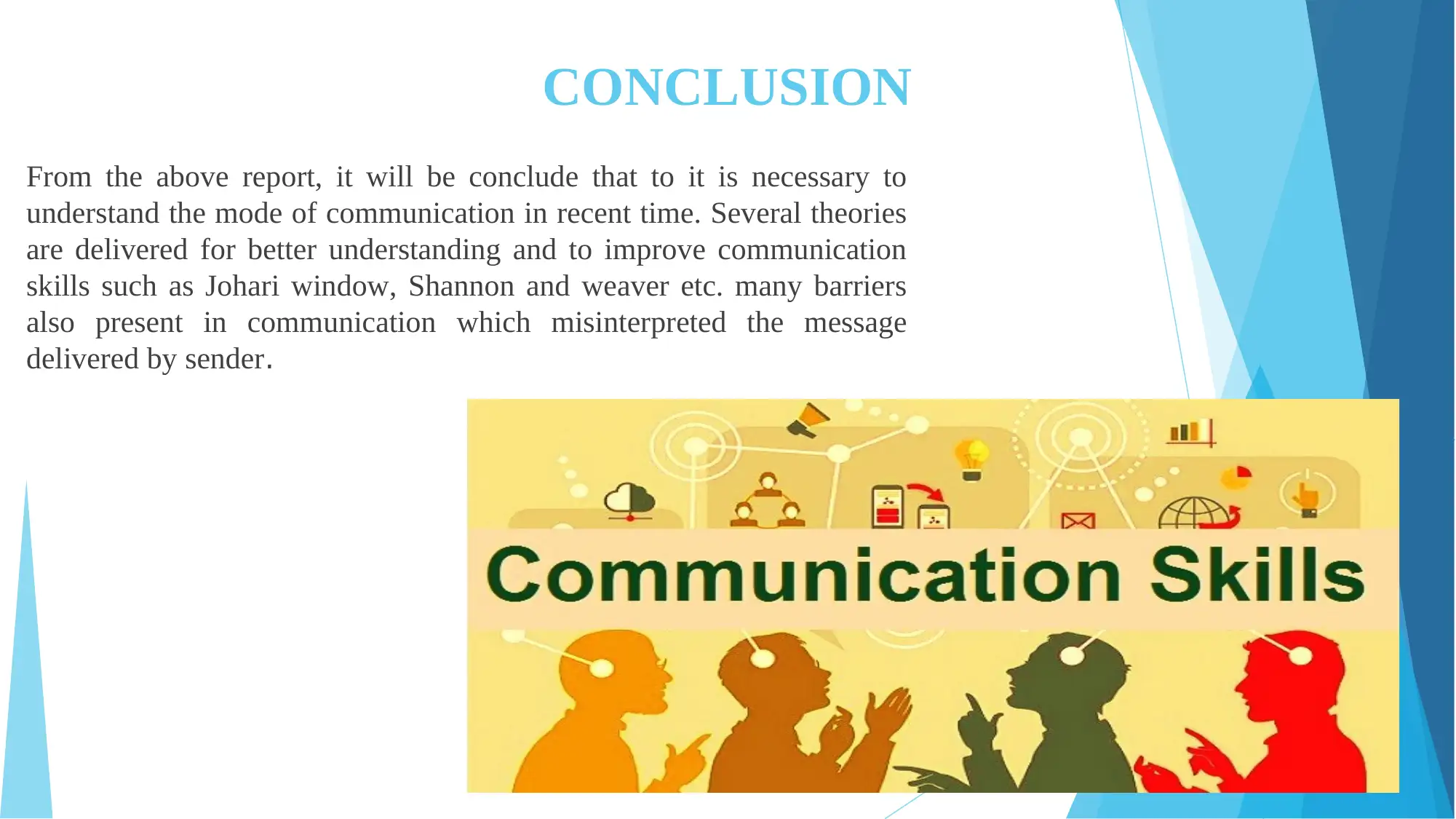
CONCLUSION
From the above report, it will be conclude that to it is necessary to
understand the mode of communication in recent time. Several theories
are delivered for better understanding and to improve communication
skills such as Johari window, Shannon and weaver etc. many barriers
also present in communication which misinterpreted the message
delivered by sender.
From the above report, it will be conclude that to it is necessary to
understand the mode of communication in recent time. Several theories
are delivered for better understanding and to improve communication
skills such as Johari window, Shannon and weaver etc. many barriers
also present in communication which misinterpreted the message
delivered by sender.
⊘ This is a preview!⊘
Do you want full access?
Subscribe today to unlock all pages.

Trusted by 1+ million students worldwide
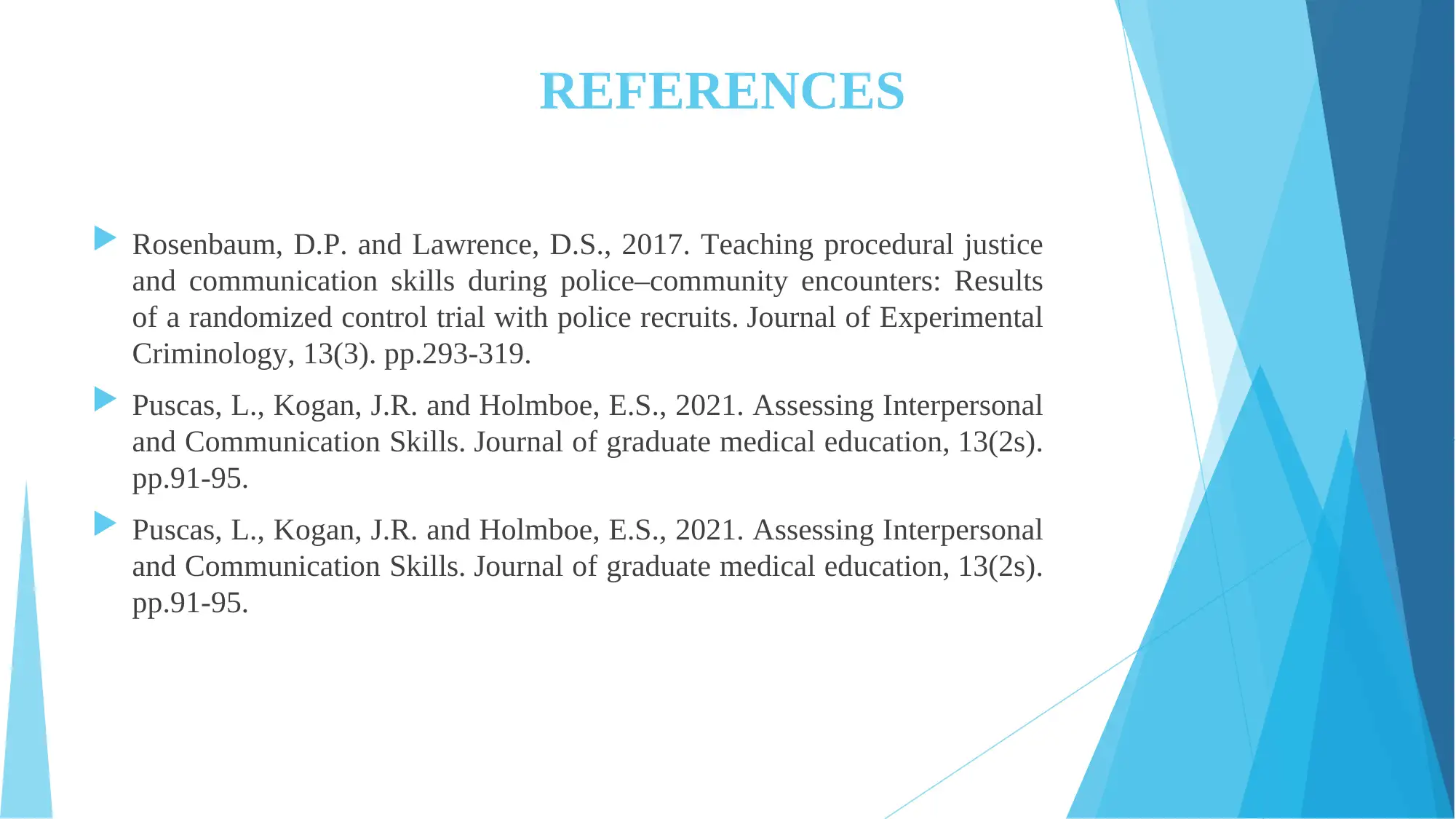
REFERENCES
Rosenbaum, D.P. and Lawrence, D.S., 2017. Teaching procedural justice
and communication skills during police–community encounters: Results
of a randomized control trial with police recruits. Journal of Experimental
Criminology, 13(3). pp.293-319.
Puscas, L., Kogan, J.R. and Holmboe, E.S., 2021. Assessing Interpersonal
and Communication Skills. Journal of graduate medical education, 13(2s).
pp.91-95.
Puscas, L., Kogan, J.R. and Holmboe, E.S., 2021. Assessing Interpersonal
and Communication Skills. Journal of graduate medical education, 13(2s).
pp.91-95.
Rosenbaum, D.P. and Lawrence, D.S., 2017. Teaching procedural justice
and communication skills during police–community encounters: Results
of a randomized control trial with police recruits. Journal of Experimental
Criminology, 13(3). pp.293-319.
Puscas, L., Kogan, J.R. and Holmboe, E.S., 2021. Assessing Interpersonal
and Communication Skills. Journal of graduate medical education, 13(2s).
pp.91-95.
Puscas, L., Kogan, J.R. and Holmboe, E.S., 2021. Assessing Interpersonal
and Communication Skills. Journal of graduate medical education, 13(2s).
pp.91-95.
Paraphrase This Document
Need a fresh take? Get an instant paraphrase of this document with our AI Paraphraser

1 out of 11
Related Documents
Your All-in-One AI-Powered Toolkit for Academic Success.
+13062052269
info@desklib.com
Available 24*7 on WhatsApp / Email
![[object Object]](/_next/static/media/star-bottom.7253800d.svg)
Unlock your academic potential
Copyright © 2020–2026 A2Z Services. All Rights Reserved. Developed and managed by ZUCOL.




